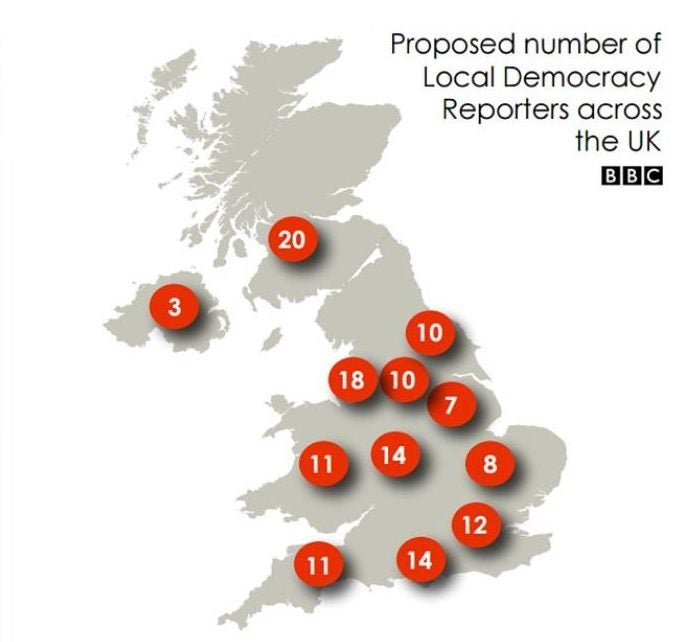
News publishers and the BBC have revealed how £8m a year will be diverted from the BBC’s £3.7bn a year licence fee income to help plug the ‘democratic deficit’ in local journalism
The money will be used to fund 150 “local democracy reporters”, funded by the BBC, but employed by “qualifying news organisations”.
The reporters will be distributed around the UK, with three in Northern Ireland (for instance), 11 in the West Country and 12 in London and the South East (see picture above).
The stories they generate will be available for use by commercial sector local news organisations and the BBC.
The BBC will advertise and award contracts to run these reporters and they will operate in “bundles” ranging from one to six.
Editor of the BBC Journalism Working Group Matthew Barraclough said in a blog post: “To ensure coverage of the whole country, we have allocated them according to top-tier local authority area (although their remit will allow them to include relevant districts, quangos and other unelected local authorities). ”
A phased roll-out of the new reporters is planned to be completed in 2018.
The scheme will also see the creation of a “News Bank” which will give outside media organisations access to BBC video and audio material shortly after transmission. This will be available later this year.
Under the scheme a data journalism hub will also be funded by the BBC with seconded staff from local newspapers.
There will also be an independent audit of how much the BBC takes stories from local newspapers (and vice versa) to improve linking and attribution.
The News Media Association and the BBC said in a statement: “Following months of detailed work and consultation with the providers of local journalism right across the UK , including the hyperlocal and local TV sector, the BBC and the NMA will now take forward agreed proposals which aim to invest in the local news media, increase coverage of public services and institutions and use the expertise of both the BBC and the local news sector for the benefit of all audiences.”
BBC director of news James Harding said: “As more power is devolved across the UK, it’s more important than ever that we cover, understand and hold to account local politicians and public services.
“The BBC has worked hard with local news organisations to develop a scheme that gives an opportunity to a new generation of reporters and strengthens the local news coverage for all our audiences. “
Chairman of the News Media Association, and chief executive of Johnston Press, Ashley Highfield said: “This groundbreaking partnership will enhance democracy at a local level by increasing and strengthening coverage of local authorities and public services, while maintaining the healthy competition between different news sources.
“Local newspapers in print and digital have a unique and highly trusted relationship with the communities they serve. This agreement will enable the BBC to benefit from our first-class local journalism, and the local news sector to be fairly rewarded for its content within an appropriate and robust framework.”
The number of local democracy reporters will increase to 200, pending the outcome of a review, in 2019. These would be funded by the participating media groups and from advertising income raised against BBC video bank content (subject to approval from the BBC board).
Over the last decade at least half the journalists employed by the regional newspaper in the industry in the UK are believed to have lost their jobs, a reduction in headcount of around 6,000 journalists.
News organisations bidding for the local democracy reporters must:
- Be able to be provide content in multimedia format including text, audio and digital format
- Must already employ journalists trained to recognised standards with relevant experience
- Ability to ensure submitted material has been checked by another trained journalist
- Be preferably located within or close to the relevant authority area.
Email pged@pressgazette.co.uk to point out mistakes, provide story tips or send in a letter for publication on our "Letters Page" blog

